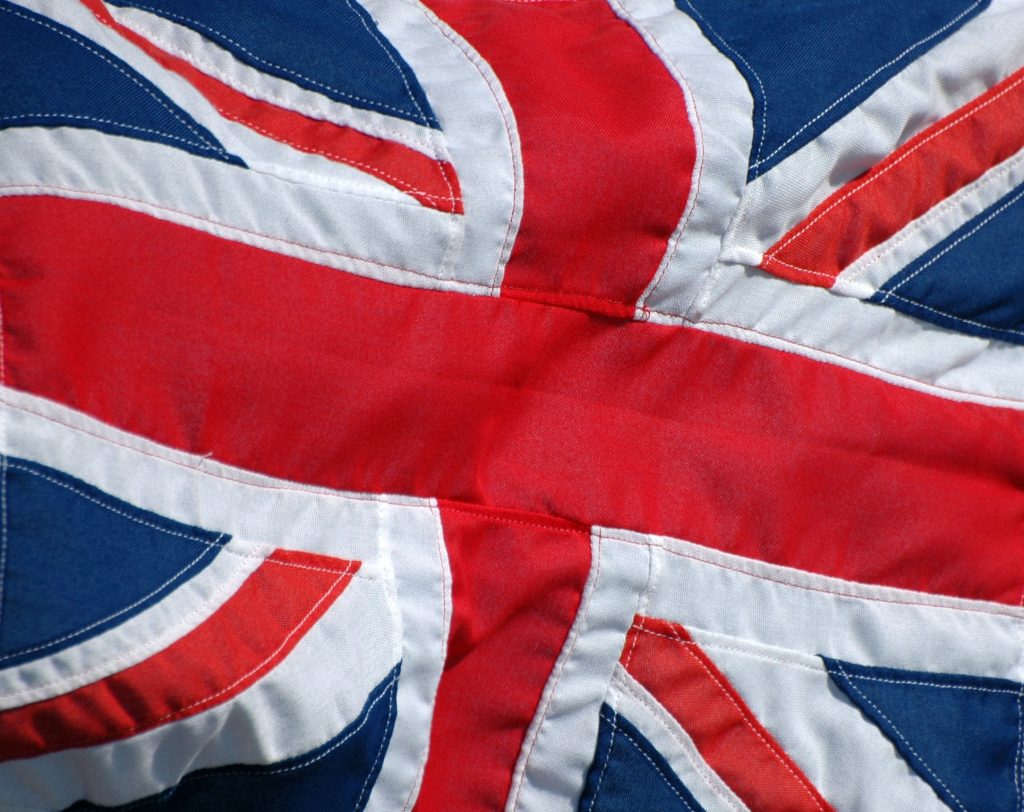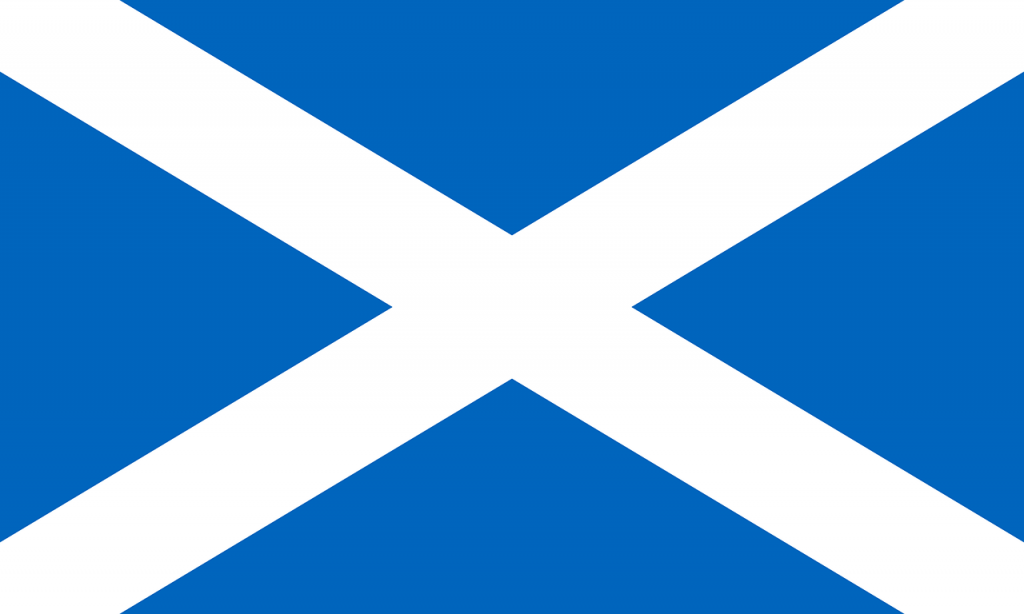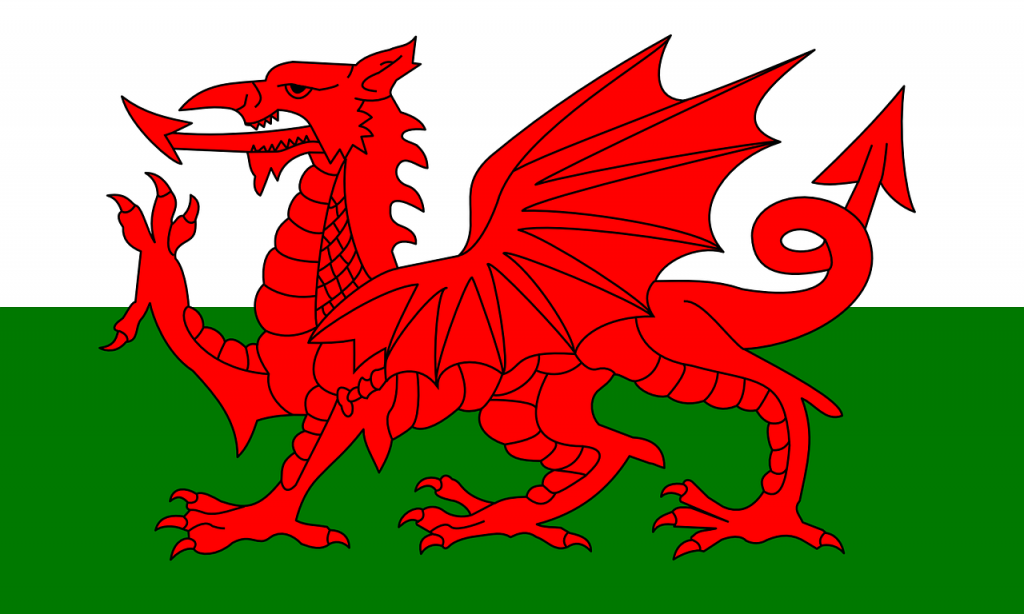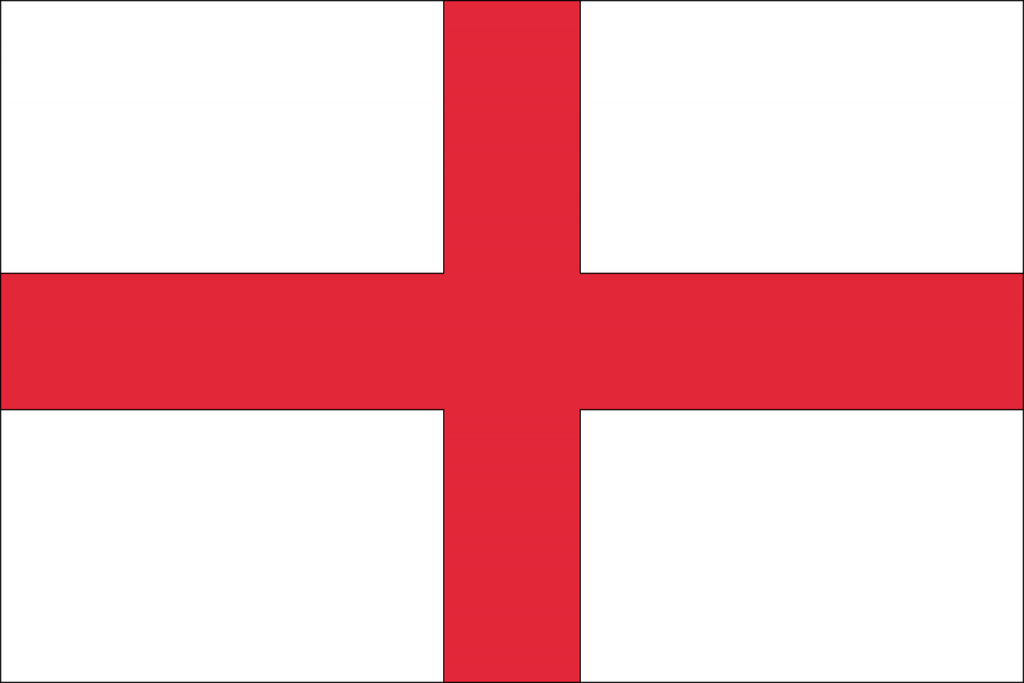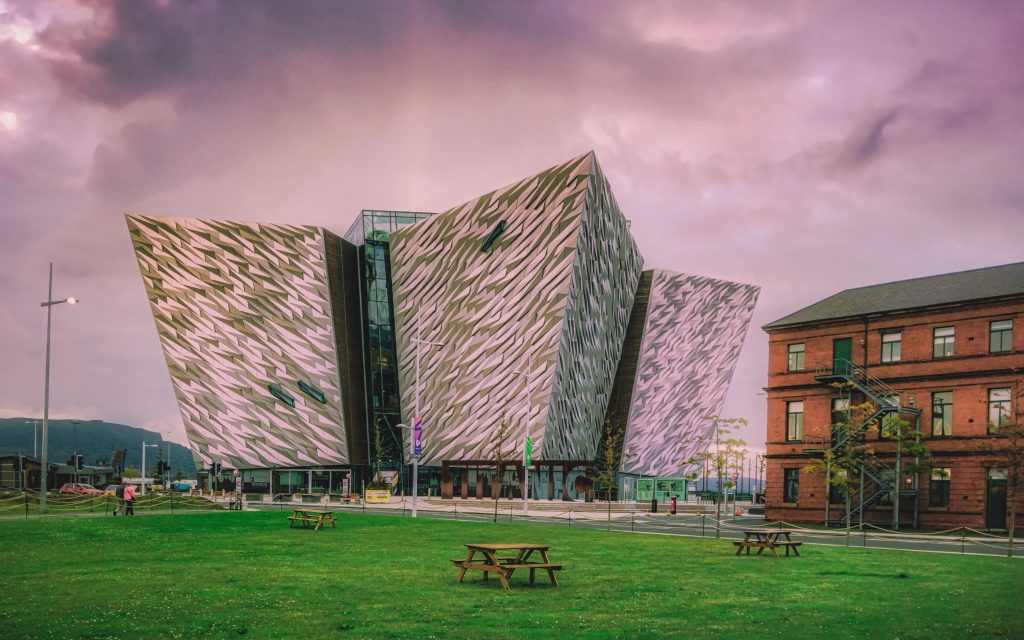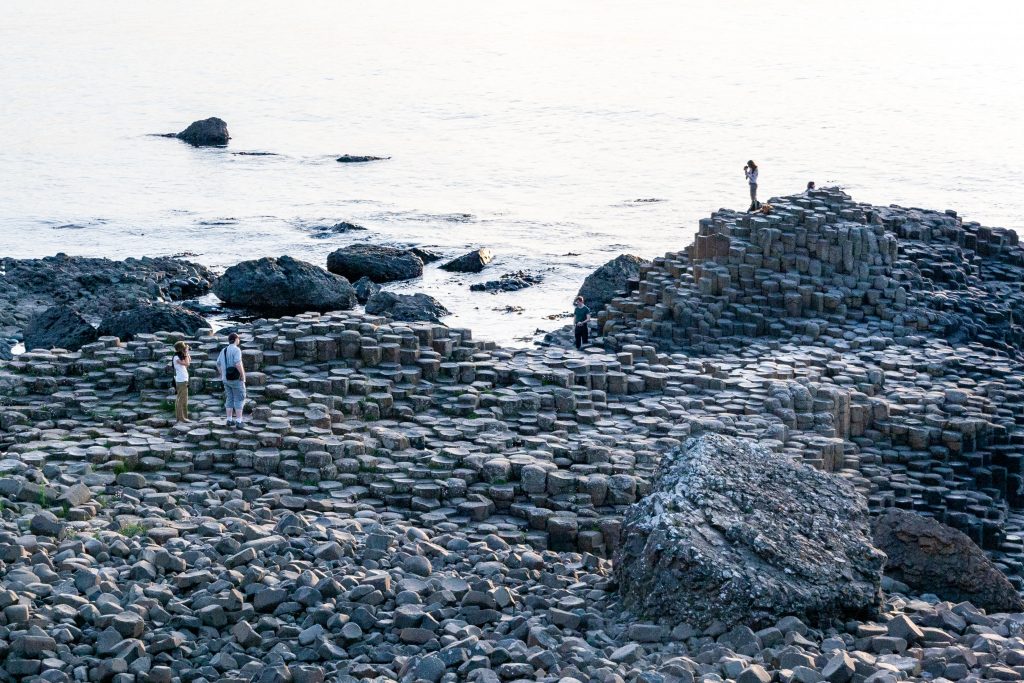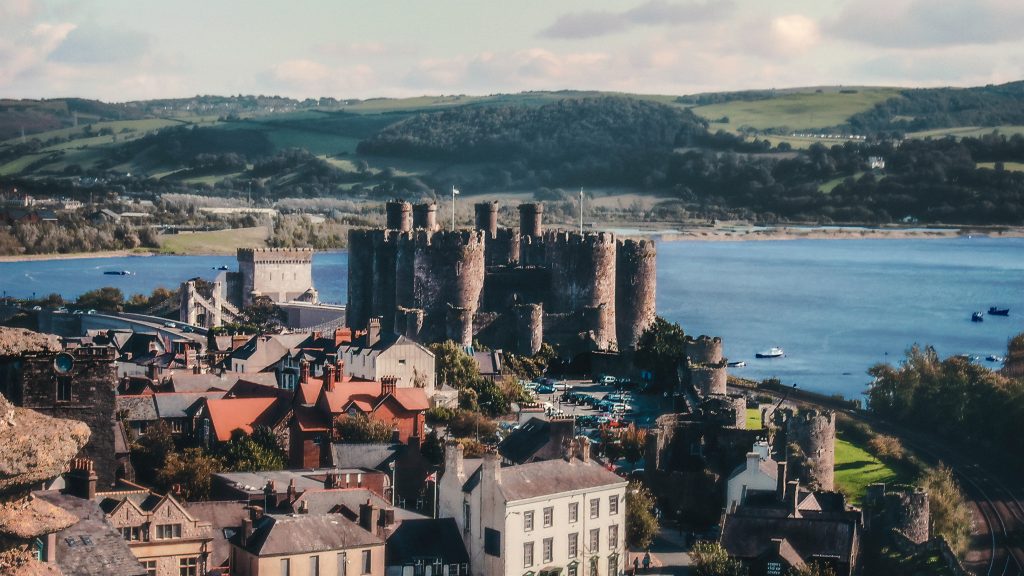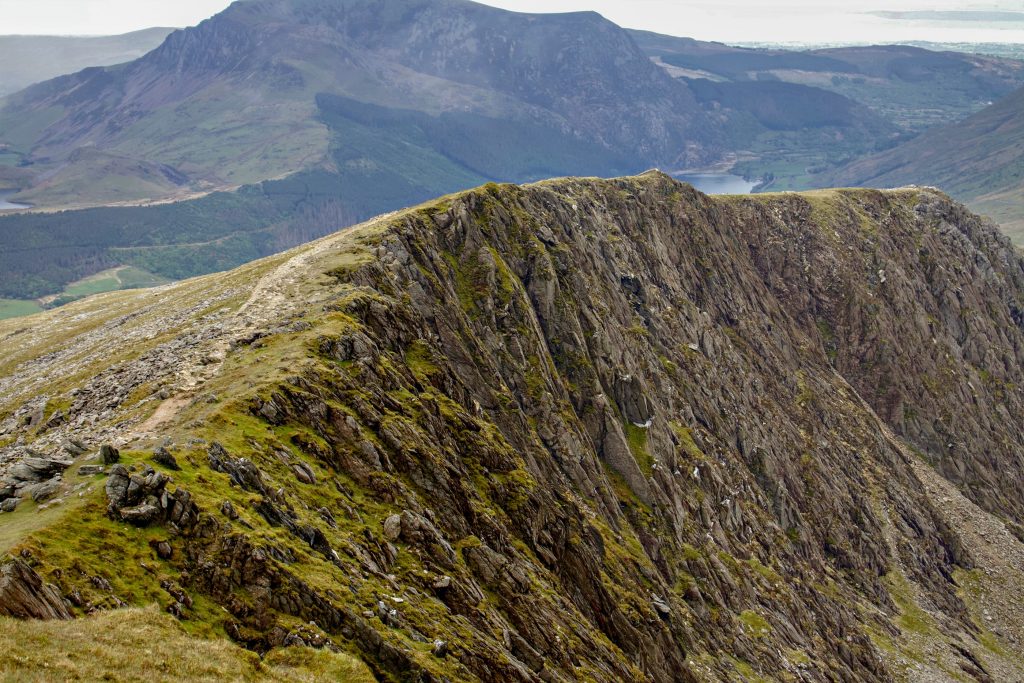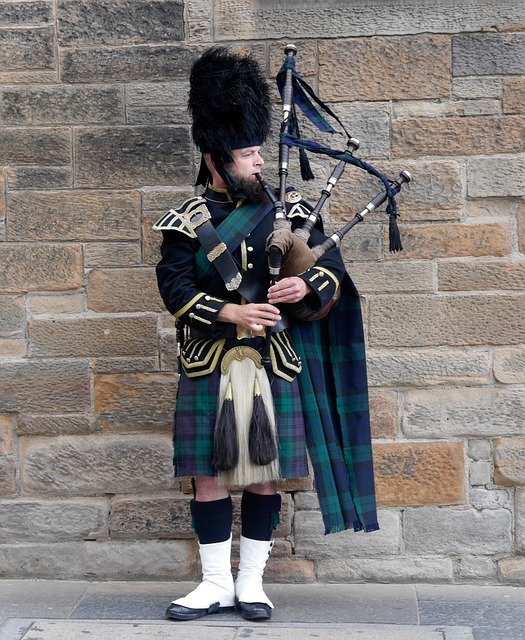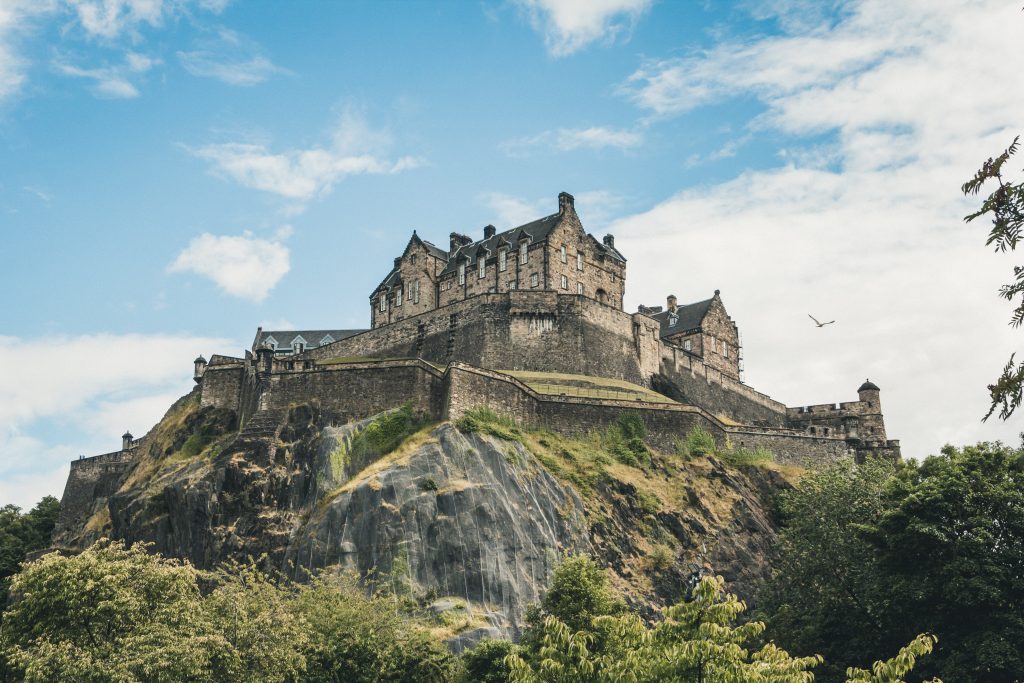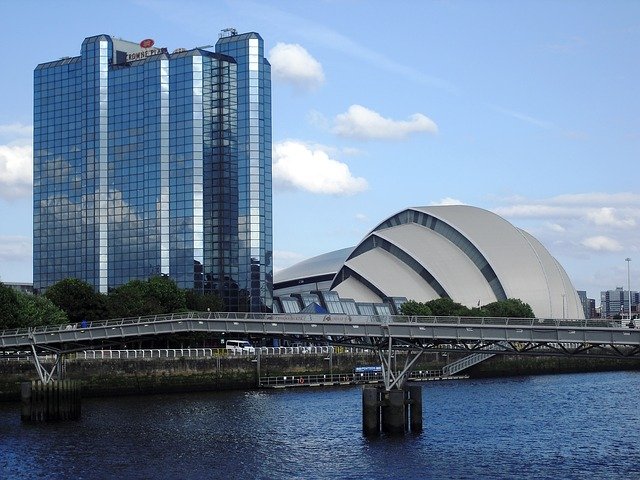English for Life in the UK - The United Kingdom
Season 2, Episode 4

Mark
Hello, and welcome to the podcast, English for Life in the UK. This particular episode is quite a long one, so we have divided it up into 4 or 5 different parts. We're talking about the United Kingdom, today, and particularly how it is formed of four different countries, four separate countries. So we're going to start by talking a bit about the United Kingdom as a whole, and then we're going to focus on the three smaller countries - that is, Northern Ireland, Wales and Scotland. We're doing that because, in the other episodes of this podcast, we often talk mostly about England, so we are going to say a bit about those and then there will be some language support at the end, as usual.
So there are three of us, today - myself: Mark, Christine and first of all, Sheena is going to introduce us.
Sheena
Hello and welcome to the podcast - nice to see you both, Mark and Christine. How are you, Mark? Are you feeling better? You were ill, two weeks ago, when I last heard from you.
Mark
Yes - thank you, Sheena, I'm a lot better. I'm not quite 100% yet, not fully recovered, but I'm a lot better than I was and I'll be fine, today.
Sheena
Great - well, it's lovely to see you and Christine, we taught a class together on Mondays, but we don't anymore, so it's really nice to see
Christine
I haven't seen her for at least two weeks, as well, so .....
Christine
No - it's very nice to see you, too, Sheena.
Sheena
Thank you.
Christine
I think I've been missing you.
Sheena
Oh, I've been missing you, too. So, Christine can you tell us what we're doing today please?
Christine
Yes. We're going to talk about the four different countries that make up the United Kingdom. So, it's called the 'United Kingdom' because it is a union of four countries and that's what we're going to talk about. So, Mark - would you start by telling us what it tells us in the Life in the UK Study Guide, please?
Mark
OK, thanks, Christine. Yes, so, it has a short section here. It says the official name of the Country is "The United Kingdom of Great Britain and Northern Ireland". So, Great Britain refers to England, Scotland and Wales, and then, Northern Ireland is separate to that and we'll talk a bit about that, later. But the four countries together make up the United Kingdom, so when people talk about just Great Britain, they're just talking about England, Scotland and Wales, and when they're talk about the United Kingdom, then they mean those four .... those three countries, plus Northern Ireland.
(3 minutes: 35 seconds)
Christine
I'm just going to chip in there, Mark and say - that is what they officially refer to, but the truth is: many people get the terms mixed up.
Mark
They do - they definitely do.
Christine
England is the largest country by far. In fact, all the other three countries: Scotland, Wales and Northern Ireland, could fit into England - it's more than twice as big. And it has 84% of the population - so not only is it the largest country, but it's the most densely populated. By far the majority of people live in England.
Scotland is the second largest country - it makes up 32% of the land, but the population is only 8%, so it's not so heavily populated.
Mark
Do you have the figure there of the actual number of people in Scotland?
Christine
I do - it's five and a half million (5,500,000), give or take . Whereas England is 53,000,000 (fifty-three million). But Wales is smaller than Scotland. It's only 9% of the land mass , so it's less than a third of the size of Scotland. It's much smaller than Scotland, and 5% of the population of the United Kingdom, live in Wales.
But then Northern Ireland is even smaller again. It's about two-thirds the size of Wales, 6% of the land mass of the United Kingdom and only 3% of the population live in Northern Ireland. So, much smaller.
Mark
I think it would be useful for listeners to know about the capital cities of the four different countries as well. So the capital of Northern Ireland is Belfast. The capital of Scotland is Edinburgh. The capital of Wales is Cardiff. And of course, as most people would know, London is the capital of England and indeed the capital of the United Kingdom.
(6:30)
Christine
And it ... I will just chip in there about Scotland - because, Edinburgh is the capital but it's Glasgow that's the largest city, by quite a long way.
Sheena
Mmm ... and two other cities in Wales that are very important are Swansea and Newport too. So Wales isn't just sheep and castles. It has very important big cities, two busy, bustling cities.
Mark
What about the flags of these ... of these countries? How would we describe those?
Well, in the transcript for this episode, we'll have some images of the flags for you, but for those of you who are just listening, we'll try and describe them for you. Sheena?
Sheena
Right. Well, I'll start with the Welsh flag, erm ... because that is actually not part of the Union flag. And the Welsh flag has a red dragon and it has a green and white field background, behind it, and the red dragon apparently comes from the King of Gwynedd (pronounced Gwyneth) in 655 - 682, who was called Cadwallon and so that has ... the dragon is a very old symbol of Wales, before it was part of the Union and, as I say, doesn't feature in the Union flag, so the Union flag shows the cross of St George, which is a red cross on a white background. It also features the cross of St Patrick - which is a cross ... Mark, you'll have to help me, what do you call the cross ...
Mark
A diagonal, a diagonal cross ...
Christine
I think it's proper name might be a "saltire".
Sheena
I think it is called a saltire.
Christine
It's a diagonal cross.
Sheena
A diagonal cross, that's a saltire - from corner to corner - so that is in red, on a white background, for the cross of St Patrick, for Northern Ireland. And the saltire of Scotland is a white diagonal cross on a blue background, and the Union flag features all those three flags. But, as I say, not the Welsh flag; that was only granted official status in 1959.
(9:03)
Christine
I think I will tell you a little bit about the history of the countries coming together, because, they were - you know, a thousand (1,000) years ago, they were certainly separate. There was no erm ... no Union at all. It was in the middle of the thirteenth century that Wales really fell under control of the English crown - so, the kings there. They didn't actually .... there wasn't an "Act of Union" that was passed by Parliament until the middle of the sixteenth century, for Wales. Erm .. The .. In Scotland it was the kings again who ... It was a Scottish King who ruled, jointly ruled the English, England - so it was James VI (the sixth) of Scotland, became James I (the first) of England, back in 1603. And it was 100 years later that the Parliaments joined together and then they were ruled - properly, governed as one country, from 1706.
Now Ireland - Northern Ireland - the whole of Ireland - I mean, for many centuries, there were English kings who would control part of Ireland - the island of Ireland. Then in 1800, there was an Act of Union between Britain and the whole of the island of Ireland - the whole of Ireland - and they were together for 122 years. It was in 1922 when Ireland - that is Southern Ireland - gained their independence from Great Britain and the six counties in the north, they ... their allegiance was still to Great Britain, and so they stayed as part of the United Kingdom. That was in 1922.
And that ... the United Kingdom has been in that form since 1922, but the smaller countries have gained, what's called, "devolution". Some of the responsibilities have been devolved to the different country parliaments. So there's a Scottish Parliament, the National Assembly for Wales, and the Northern Ireland Assembly. They were all set up at the end, right at the end, of the twentieth century. And they have powers in the field of education, health, transport - things like that. It's slightly different in each of the countries, but that's it.
(11:52) (Music)
Christine
So - let's look at the smaller countries, in turn: Mark would you like to start off and tell us a bit about Northern Ireland?
Mark
Maybe we should just pause and say there are two difficult words here, for people who aren't used to the language. So, an island as in a piece of land surrounded by sea, is spelt:
I_S_ L_ A _N_D
but one of those islands is Ireland, and Ireland is spelt :
I _ R _ E _ L _ A _ N _ D.
So that can get very confusing when you're talking about this.
Christine
Yes, I just got confused, Mark, so thank you.
Mark
Anyway, the island of Ireland has had a very turbulent history, as you said - that's a history full of conflict and divisions and sometimes wars, involving England, or Great Britain, but as you say, the key thing is, in the twentieth century, in 1922, the island was split in two and it was Northern Ireland that stayed as part of the United Kingdom. That has caused conflict in lots of ways, ever since - indeed, there was conflict before - for a variety of reasons. The majority of people in Northern Ireland were from the Protestant religion - that is, the religion associated with the Church of England - whereas in the south of Ireland, it was mostly Catholic, but there's always been a significant number of Catholics in Northern Ireland as well, so there has been conflict over religious groupings. Then, there has been over the whole issue about whether Ireland should be a single country, as opposed to divided into the two, and there's always been groups that have argued on different sides of that. It's also the case that many of the population of Northern Ireland originally came from Scotland and from England, into Northern Ireland, and again, that has been an area of some dispute, over the years.
In the 1960s and for a good thirty years from the end of the '60s onwards, there was major conflict in Northern Ireland, over those kind of divisions. And something called the IRA (the Irish Republican Army) began a campaign of violence against the - what they saw - as the British State in Northern Ireland and indeed, the mainland of, particularly, England, that included bombings and other terrorist incidents, the killing of soldiers. But similarly, there was also a violent group on the side who wanted Northern Ireland to stay as part of the United Kingdom, called the Ulster Volunteer Force, and they also carried out violent acts. So there was a very difficult period through all of that, but at the end of the 1990's, the end of the last century, there was an important peace process which led to something called the "Good Friday Agreement". And the Good Friday Agreement was an agreement between the United Kingdom and Ireland, that is the Republic of Ireland, Southern Ireland, over what would happen to Northern Ireland, and that's when the Assembly of Northern Ireland, that you mentioned, Christine, was set up and that Assembly, uniquely, actually has what's called "power-sharing". So, the two major political parties, which is: the Democratic Unionist Party, which is a Protestant, largely Protestant party, and Sinn Fein (pronounced Shin Fane) which is a largely Catholic, Republican Party share power, with the largest one becoming the First Minister, the most powerful, and the other one being the Deputy, but where decisions have to be taken through a shared approach. It's not always worked, but that is the system and that is back in use now at the moment. So ... and that has led to the Assembly of Northern Ireland taking on some of those powers, that you described, Christine. So briefly, but it's a complicated history and I don't suppose that's finished yet, because we've got the complication of Brexit, of the United Kingdom leaving the European Union, because Southern Ireland, the Republic of Ireland, is ... will remain in the European Union whilst the United Kingdom will come out, and so there will continue to be some difficult issues around all of that.
Just a little bit about the culture of Northern Ireland. There is actually an Irish language, called Gaelic, which is also a version which is also spoken in parts of Scotland, but the main language remains English, but there is an official recognition of Gaelic, as a language. Ireland is renowned for certain sports - Gaelic football and hurling are particular sports, rugby is very popular in Ireland and unusually - all three of those sports - it's the whole of Ireland, North and South, that play against each other and together. Yes - it has a strong literary tradition - very famous poet called Seamus Heaney is from Northern Ireland. Famous for its music, traditional folk music and Irish dance is an important part of the culture there.
The economy is largely farming, traditionally, ship-building - the famous ship, the Titanic, was built in Northern Ireland - and also lots of cultural industry, the arts and tourism, particularly as the "Game of Thrones" was filmed in Northern Ireland and that has led to a big increase in tourism, there.
Christine
It has some beautiful countryside in Northern Ireland.
Mark
And it's also got some beautiful countryside, perhaps the most famous bit of which is called the Giant's Causeway which is a beautiful rock formation on the coast of Northern Ireland. So, I think that tells you a little bit about Northern Ireland.
(Music) (19:55)
Mark
Sheena, are you going to tell us a bit about Wales?
Sheena
Yes - I haven't got so much political history about Wales, but I'm talking, in many ways, as a tourist, because I've visited Wales, quite a lot myself, so it's the kind of things that I've experienced there. So, please feel free to add anything, when I've finished.
One of the things that has always interested me about Wales is the promotion of their language - of the Welsh language. That has always appeared to me to be very, very strong and I was interested to read that nearly 20% - 19% of the population - are Welsh speakers, as well as English speakers, but they do speak Welsh; so that's half-a-million Welsh speakers and what the Government are hoping for, because this is very Government-driven, this Welsh culture and the promotion of the language, they're hoping that, by 2050, that a million people in Wales will be speaking the language, so instead of losing the language, they're actually gaining more Welsh speakers, now. In the Welsh Parliament, AM's I think they're called - can either speak and write in English, or in Welsh, so there's absolute parity between the two languages. I know someone who's training to be a doctor, in Wales, and she had to improve her spoken Welsh, because it's important, at the University she's at, in Cardiff, that anyone training to be a doctor, is quite fluent in Welsh as well, so that they can speak to their patients, in Welsh. There was a quote as well - I don't quite know where it came from - but I think it sums up the feeling of a lot of Welsh people - especially the people who are promoting the Welsh language - that:
"A nation without a language is like a nation without a heart"
So a lot of the Welsh language is there, in the songs and the poetry, they have a bardic culture where they've always had poets who have made up poems praising the kings and things like that. They have the National Eisteddfod: every year it moves around in Wales - you know, Welsh songs, Welsh speaking, Welsh poetry, is celebrated. TV stations and Welsh radio stations are very, very popular and quite a lot of the schools and, I think, this is ... there will be more of them soon, offer the whole education in the Welsh medium. So, you know, a lot of the people now are learning everything through the Welsh language. So that seems a really interesting story because a lot of countries lose their language over time, don't they? And this is a country that's trying desperately hard to promote their language. The other thing, ... I don't know if you've got anything to say about Welsh language?
Christine
Well, one thing I want to mention is as soon as you cross the border into Wales, all the road signs you see written in both languages.
Sheena
Absolutely - yes - everything, isn't it? and you hear a lot of Welsh spoken, just quite naturally, in the streets and things, as well.
The other thing that I think Wales is well-known for is the castles. Apparently, there's more castles per square mile, than anywhere else in the world, so ... yes - a lot of this is historic as well, of course, because sometimes it's been local Welsh dynasties have built their castles, but sometimes it's been because of the fighting between the English and the Welsh and an attempt to subdue the Welsh, so I'm sure a lot of people know about Edward II (the second) and his castles. His castles are at Harlech, Caernarfon, Beaumaris. I've been to all three of those castles and they are still in amazing condition, now, for people to go and look at. So they're still there as a reminder of the time when the Welsh revolted against the English, but were subdued, and they're now part of a UNESCO site. Lots of beautiful castles - some are ruins, some everyone can go to visit, but they're all in very beautiful positions, in the mountains, near the lakes, by the sea. And I think that's one of things that I think of, when I think of Wales, is the beautiful scenery - it's known for its high mountains; Snowdonia - is a very ... it's a National Park in Wales with Snowdon, the mountain that lots of people climb. Some people get the train up and walk down or they do it the other way round, but I've never actually climbed Snowdon. I don't know - have either of you two climbed Snowdon?
(25:40)
Christine
I have.
Mark
I have. I did. I climbed Snowdon with my son on my back when he was a few months old.
Sheena
And did you walk up and down? No cheating!
Mark
I can't remember - I think we did, actually. But I can't quite remember - it was a long time ago now. Forty-one years ago, to be precise!
Sheena
Well, it's still there Mark, if you want to go back and climb Snowdon again.
Christine
I climbed it - I'll just say, I climbed it with ropes - you know, up the cliff face!
Mark
Impressive ... The hard way!
Christine
In my twenties! And we did it again, with my young son and we caught the train to the top.
Sheena
Right - I think it's an experience a lot of people share, isn't it? Going up Snowdon. I think a lot of people go to Wales now, don't they? for walking and outdoor holidays. It was well-known for its coal mining in the past and now some of those ex-mining areas have things, zip-wires (it's got the fastest zip-wire in Europe) there's a lot of mountain biking in Wales now, so they're trying very much to attract younger people to the outdoors so tourism is really important and there's a lot of railways, lots of steam railways, around. So, I think that's all I'm going to say, at the moment, about Wales, unless you can think of anything else?
Mark
Can I just come in? Because, having mentioned sports in Ireland I think Welsh people would not forgive us if we didn't say that rugby was the big sport in Wales. And, Christine was telling us how small the population is in Wales, and yet they regularly, over the years, have the best rugby team, certainly in the United Kingdom, even sometimes within the world.
Sheena And also, great singers - I imagine that the rugby matches because when I was in Wales a few weeks ago, I was walking near Snowdon and there was great upset in the pub because of lockdown ' because the male voice choir, about sixty men, who sang with a female conductor as well, who were no longer able to sing because of lock-down, so singing in the chapels and in the male choirs is something that Wales is very famous for, isn't it?
(Music). (28:28)
Sheena
So Christine, Scotland!
Christine
Scotland. Yes - I mean I come from Scotland, I am Scottish, and I was brought up there and I have visited very regularly, because I still have family there, so I do know Scotland quite well. So - it's interesting, when I tell people I come from Scotland or when people start thinking about Scotland, images come to their minds. What would you say, comes to your mind? I don't know.
Mark
Well, I suppose I think of a person in a kilt, playing the bagpipes , eating haggis, drinking whiskey.
Christine
Yes - Sheena, what images come to your mind?
Sheena
Yes, I think the same, maybe mountains and castles as well, but kilts, I think. I went to a wedding where the men were wearing kilts and they're amazing. They're just beautiful to look at and the way they move when people walk and things. So kilts are the main thing.
Christine
Kilts - these are traditional Scottish - part of Scottish life. I mean, a kilt is a skirt that men wear - a pleated skirt, so as you say, when they move it swings, very nicely.
Made of tartan, which is a coloured fabric - traditionally, different families wear different colours of tartans. So, that's often what people, particularly tourists, that's what they imagine they're coming to. This land of mountains and castles and lochs - 'loch', of course, is another word for 'lake' - and they do all exist in Scotland, but Scotland is a very diverse country - I mean, very diverse. Those images are mainly from the Highland of Scotland, which is the northern part of Scotland. Most people in Scotland live in the central belt, between Glasgow and Edinburgh, and you know it's low-lying land, and people don't, well, traditionally, don't wear kilts. In fact, the kilt has become, you know, something that is worn on special occasions now, all over the country, so people do. But traditionally, in fact, when I was young, (I'm 67 now), when I was at school, nobody wore a kilt, you know, because we were 'lowlanders'. You didn't wear a kilt. But it's very diverse. And it's the same throughout Britain, actually, all the countries - there's great diversity, both Sheena and Mark described Wales and Northern Ireland, but there's huge diversity.
Again, when I went to school, I went to secondary school in the East Neuk of Fife, it's called. It's a small part, north of Edinburgh, with lots of little fishing towns. And people could tell which little town somebody came from, by a change in their accent. The way they spoke - so language changed from village to village, and town to town.
Scotland in its time, you know, 100 years ago, was a big industrial nation, there was mining, also in Scotland, there was shipbuilding, but, of course, most of those heavy industries have gone now. And like Wales and Northern Ireland, there is still a lot of agriculture and a lot of tourism. It's ... it's interesting, though, there has always been - I think it's fair to say - an independent, I should say, independent, but really I want to say, anti-English, feeling. When I went to school, I was brought up to hate the English, so I had to keep it very quiet: the fact that my father was English - I didn't want my friends to know that.
(32:58)
There is a very strong independence movement in Scotland and still, now. The Parliament - the Scottish Parliament - was set up and the vote, the people vote for the Scottish Parliament, by something called proportional representation; rather than just voting for ... having one vote, you can vote in turn for all the different parties, and that was set up, to avoid one single party ever having control, ever having a majority. That was the way it was set up. In recent years, the Scottish Nationalist Party (the SNP) - the party who want independence - have been so popular and so strong, that they have a substantial majority in the Scottish Parliament and independence is still a big thing.
(Music) (34:03)
Mark
This is the part of the podcast where I choose some of the words and phrases from this episode and explain them in a little more detail.
Today I'm going to choose two technical words - two words that were important to some of what we were talking about, in this episode, and then two interesting English phrases. So the technical words:
The first one, is the word "devolution" - this was used particularly by Christine, in this episode, and to devolve powers means to move or transfer the powers of a central government to a more local level - to a smaller or local level. In this case, in this episode, we were talking about the Government of the United Kingdom, that is the Parliament in London, devolving - moving - powers down to the other countries: that is, Wales and Northern Ireland and Scotland. But you can also devolve powers to regions or cities - so London or Manchester has devolved powers from the central government. So devolution is the noun used to describe all of those changes.
The second term I wanted to use was the word "republic" and "republican". When we were talking about Ireland, we said that Southern Ireland is a separate country and is called the Republic of Ireland. So a Republic is a state or country where the highest power is held by the people or their elected representatives through, for example, a Parliament, but it is used, usually, for a country which doesn't have a monarch - a King or a Queen - so the Republic of Ireland, Southern Ireland, is a separate country and does not have the Queen as their Head of State. They are a Republic. And those people who believe that the whole of Ireland should be a separate country are often referred to as Republicans. They are Republicans. I hope that's helpful.
The two phrases that I wanted to pick on - Christine, towards the beginning - when she interrupted me - she said I'm just going to chip in - "to chip in" means "to make a contribution" to something. In this case, Christine wanted to make a contribution to what I was saying, she wanted to interrupt me, to stop what I was saying, so she could say something else that was useful and interesting to do with that subject. So to chip in, is to add to something. It's also used sometimes when, for example, people are deciding who's going to pay for a meal, or pay for something, and somebody may say "let me chip in", that means "let me make a contribution", "let me add some money to it". But, in this case it was - let me chip in, let me say something extra, to add to what's being said. So you can find uses for that, if somebody is talking to you and you want to say something, you could say "could I just chip in there?" - that means: can I now say something? And you can use that as a way getting into a conversation, for example.
And then secondly, ... Sheena, it was, who said - she was talking about her quote about the Welsh language - and she said, "it sums up the feeling of people". Now to "sum up" something, means to explain, in a different way. To 'summarise' is another word which means to 'shorten' - to find a way of explaining or expressing something in a simple and easy way. So the quote summed up the idea of the importance of the language to Welsh people.
That's it for this week. Rather a long episode so please listen to it in parts, if you need to. You know the transcript will be available very soon, on our website, That is:
www.staugustinescentrehalifax.org.uk
And you can also find all our other episodes on that website and also how to donate or make a contribution to us, as an organisation, if you feel you are able to do that.
Finally, we have an email address. We'd love to hear from any of our listeners and that is:
EnglishforlifeintheUK@gmail.com
That's it for this week - look after yourselves and we look forward to joining you again, very soon. Bye.
